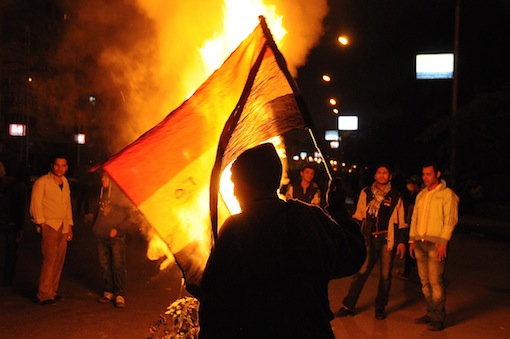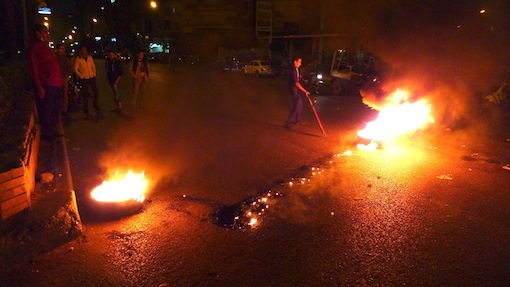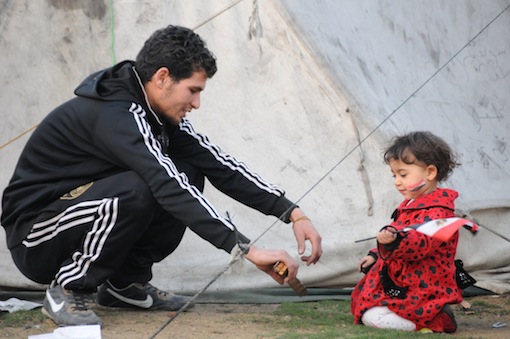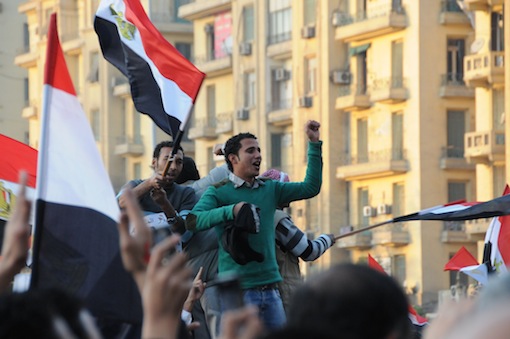Tahrir Square is dark, and all of a sudden endlessly sad. There are still countless tents in the middle of the roundabout, banners carried by the wind, even a small and provisory ‘Museum of Revolution’. From time to time one can hear, as if some echo of bygone and glorious times, passionate music and the fiery speeches of protesters. Once in a while the sparks of the former euphoria explode in a delicate and short-lived firework, only just to melt swiftly away into the night.
But this is not the same Tahrir Square that had attracted electrified crowds, some two years ago. Now, glances are suspicious, and trust is in short supply. And there is an omnipresent fear all over the place; too much fear, too much…
Most of the kindness and solidarity evaporated, and what replaced it is horrifying. Local gangs developed precise tactics, allowing them to isolate single women from the crowd, who are then dragged to tents and abandoned spaces, and brutally raped. It has already happened on several occasions, in just few recent weeks.
Many shops around the square have been looted, some repeatedly. Gangs are insulting and harassing reporters, in fact anyone with a camera, anyone asking questions. After sunset, I am often the only foreign-looking person working in the vicinity of Tahrir Square.
“No!” screams a young boy frighteningly, penetrating me with his adult and criminal glances. Just as I point my cameras towards the tall wall that cuts the center of the city in half, ‘protecting’ the US Embassy. I know that to show the weakness would be deadly and I move on the kid, literally clearing him off my way. He backs up and shouts some loud insults. A few seconds later an entire gang of 10 to 14 year-olds begins surrounding me, tugging at my sleeves, slapping my coat. It goes on for almost a minute. I keep working. I ignore them. Then some adult and genuine protesters intervene.
The nauseating smell of urine is everywhere. Garbage covers the square. It used to be relatively clean; the pride of the Revolution. Now it is all filthy, garbage everywhere.
“The US is involved, no doubt”, explains my friend, Dr. Mohammed Shafik. Before I return to the square, we are lounging at the psychiatric ward where he is on his 24-hour duty shift. He attends to the patients, but in between his work we drink coffee, debating Egypt and my reports that he would like to translate into Arabic.
“The United States is indirectly saying: You had your revolution, your elections; you have your political parties”, continues Dr. Shafik. “Now go and consume! And vote every 4 years for the parties that do not represent you at all… The US has been supporting both the Muslim Brotherhood and the Liberals, including El-Baradei. It even helped to push Mubarak out of the way. As long as the opposition has no strong social message, the US is fine with the regime change. And with the Muslim Brotherhood, the ‘free market’ system is guaranteed. Two Brotherhood leaders were even flown to the US; one of them was Khairat El-Shater.”
* * *
But is everything lost?
On Tahrir probably yes, but not in the entire Egypt.
The masses that move back and forth appear to be fragmented. Friday is their big day, but by now, most of the people have run out of steam and are confused. A few youngsters paint graffiti. The artwork on the walls is increasingly violent: depicting people shot through their heads, with parts of their jaws missing. Optimism has disappeared: bloody and frightening wounds have become the topics depicted by contemporary art. Martyrdom is in vogue, but it is not invented; it is real. There are paintings and photos of the martyrs of the revolution – those who died, those who died young, those who died very young. At least 59 people were killed in the recent wave of violence, and everybody knows that the real numbers are much higher.
I ask Mr. Ali, a local painter who sits at the entrance to the Revolution Museum, what comes next?
“Mubarak, the military and Islamic brotherhood are the same”, he replies, gloomily. “And the Islamic Brotherhood has close ties with both Israel and the United States. Mubarak is now in prison, locked up for a quarter of a century, for murdering people. So what? Morsi took over! He is now the one who is doing the killing.”
“People voted for him,” I utter.
“One half, yes. 51%. And elections were a sham. But even if they weren’t sham, you know that people in Egypt are not educated, they don’t know how to think politically. The Brotherhood was elected, yes. But once they began murdering people, morally speaking, their mandate expired!”
I am waiting for my friends from the Revolutionary Socialists organization.
As I film and photograph the scene, a woman approaches me and begins screaming to my face: “Who are you? What is your nationality? For whom are you working?” I give her my card, but she continues screaming, not even bothering to read. She wants to insult me, not to know.
An old man with black rotten teeth comes from behind: “She thinks that you are an Israeli spy… Are you a journalist? Do you want to interview El-Baradei?”
“No”, I reply sarcastically. “What about Khaled Ali, from the labor movement?”
“Good choice! I can arrange. I can arrange Morsi, El-Baradei and Khaled Ali. Me – I have contacts everywhere. Me – I am the director of the museum. Everybody knows me here; my name is Mr. Magdy.”
I know who he is. I am not new here. Mr. Magdy owns a gallery that used to sell fake papyrus to tourists. It is called monumentally, the ‘Pharaoh’s Museum’. It is quite a big institution and Mr. Magdy is a big con artist. But I have some time to kill before my friends arrive, and so I ask him: “Mr. Magdy, what is becoming of Tahrir Square? It used to be such a joyful place, full of hope…”
He is being diplomatic. He is neither with nor against the protestors: “People of Egypt have no education. They don’t know what they want. They have no idea what a true revolution is.”
“Do you, Mr. Magdy? Do you know what is true revolution?”
He gives me a sly, bit crooked smile. “Let’s go to my museum”, he says, finally.
“Bye Mr. Magdy”, I wave at him. He swears under his breath.
* * *
And then they arrive – my friends. Three men and two ladies, all smiles, determined, honest, pure. They are all young; they are socialists, all educated and all giving their lives to the revolution, unconditionally.
They are not overly optimistic; they clearly see the monumental challenges ahead. They all live in Cairo, except for Manal who has just returned from London, where she works for a major Arabic newspaper.
I ask her the same question: what happened to Tahrir Square?
“It changed”, she answers with a sad smile. “Since I left, just a few months ago, it has changed. It is gloomy now. We had such hopes after our revolution, but now there is so much violence inside Egyptian society. And it is very dangerous violence, with absolutely no rules. Before, police used force against civilians. Now civilians are attacking civilians. There is something dirty going on; something terrible is taking place… There are hidden forces. And look at the leadership of the army: the violence they are using against us is even worse than the one that was applied by Mubarak.”
We take a break at a local café. Young people are outraged by the media coverage of Egypt in the Western media. “It’s a total disaster, especially what is being spread by the BBC. They act as if they are not familiar with Islam and its culture. And they fully adopted Morsi’s terminology. They call protesters ‘thugs’. They confuse everything, they generalize…”
Before leaving the hospital, I asked Dr. Sqafik who those people occupying Tahrir Square are?
He shrugged his shoulder: “Us – leftists – but also Mubarak supporters who are now protesting against Morsi and the Muslim Brotherhood… There are secret service agents all over the place. There are gangs as well as some ordinary people, simply venting their grievances against the Brotherhood…”
I look at Manal, and then I look at her 2-meter tall friend – Ahmed.
“Listen”, I say. “Nothing feels right, here, somehow…”
“You noticed… Tahrir is no more; it was destroyed. It is not the symbol of our Revolution, anymore.”
“So let’s go to the Palace”, I suggest.
Manal has just returned from London. She is tired. We are all tired, exhausted. She hesitates for just a few seconds, but then she nods.
* * *
We hire a beat-up minivan and cram ourselves inside. There are more and more of us; the group is rapidly expanding. Young men and women sing on top of each other; they are joking and teasing. We photograph each other, pat each other, and encourage those who appeared to be scared.
Before, I used to ask, whether our Latin American Revolutions had any similarities with the Revolution in Egypt. I don’t have to ask now; I see it with my own eyes. These people, my new comrades; this young Egyptian vanguard, is as determined and self-sacrificing as those who brought down the right-wing regimes in Bolivia, Venezuela and Ecuador.
While Egypt is descending into chaos, while brutality, dishonesty and immorality are ravaging both the capital and the provinces, while hopelessness mutates to violence, I am roaming the streets of Cairo with a group of determined revolutionaries.
“These young men”, whispers Ms. Wesam, a sister of Manal, “They were fighting for Egypt since the first days of the Revolution; since two years ago. They never stopped. And they never will.”
‘Until the final victory’, I smile.
The light inside the van is blinking. The sirens outside are howling. And suddenly we are arriving, at Heliopolis.
* * *
Tires are burning and distant explosions are penetrating the night.
“Keep your cameras hidden”, I am told. “There are snipers all around. They killed our friend – a reporter – right in front of the Palace.
At the pitch-dark intersection, an old man surrounded by a small group of people extends his hands to us.
“His son was murdered by Morsi’s regime”, says Manal, in a matter-of-fact voice. “He needs to be outside; with other people. Otherwise his grief will become unbearable.”
We hug the man and we go in the direction of the palace, along the tram tracks, towards the fire and explosions. I photograph ambulances and then a spectacular sight – an Egyptian flag waving in front of the fire.
Thousands of protesters are moving like ghosts, up and down the avenue. I don’t want to use the flash; it is unsafe for the protesters; flashlight triggers some unwanted reaction from the armed forces. But without it, even at the speed of 2.500, everything comes out too dark.
Then suddenly we hear screams. They are coming from ahead of us, and thousands of people are running in our direction. I have no idea what is going on: for a moment I think that the army is sending in tanks, or that the police have begun using live ammunition, as I saw them do in Port Said just a few days earlier.
“They are using tear gas”, screams Wesam.
Tear gas? I wonder. I have covered dozens of conflicts and wars all over the world; tear gas is definitely one of the least frightening things one can face in a conflict zone. I am slightly disappointed, even annoyed by the speed and determination with which the crowd is running away.
And then I feel it. The gas… First just a bit, as it enters my nostrils and eyes. Then I get a full dose of it. I begin to swear. I almost lose my balance – almost faint. ‘What the hell is this?’ I think. This is not some Peruvian or Indonesian tear gas; this is not a gentle Chilean brew. It is not even what I smelled on the banks of Nile, on January 28th,earlier this year. This is monstrous, potent, and deadly!
I stumble, regain my balance and stumble again. Ahmed throws his towel my way. I press it to my nose. It helps just a bit.
“Bastards!” I scream.
“It’s poisonous and carcinogenic, we are running analyses of it in the lab”; somebody offers an explanation, on the run. “They are poisoning us…”
I remember what I was told: many protesters consist of young doctors, engineers, and teachers.
“A kid has fainted”, screams Ahmed, half outraged, half laughing. “So his friends begin reviving him, but as he opens his eyes, two tear gas canisters explode right next to him, so he faints again… ‘Take him away!’ I yelled at them!’”
It is all both drama and fiesta. The side streets are full of people. Ahmed and his friends form a circle, embrace each other and begin jumping and singing: “We love to sing to our dear dead friends: Morsi, Morsi, Morsi!”
The night is still young. Later, in Cairo and the provinces, almost 100 protesters get arrested and 120 are injured. Those who are arrested in Egypt are often tortured; some disappear.
* * *
Late at night we walk towards the subway station. We are tired and hungry, but still joking. Ahmed and his friends are playing around, chasing each other, acting silly. Our group is like a ball of light in the depressing darkness of this decaying city.
Tahrir Square died; it is no longer the symbol of the Revolution.
But that night in Cairo I understood that the Revolution has not been defeated here, that it never will be defeated, that it will continue until the final victory.
I also realized that it is time to stop asking silly questions about the ‘lack of leadership’ here. There are strong leaders – Khaled Ali and others – and there is a strong socialist agenda embedded in the several groups that participate in this Revolution. The battles will not be fought the same way as they were fought in Bolivia or Venezuela. Egypt is not Latin America. But they are and will be fought – things will be done and all of us who can help should be helping now. Because those brave men and women that I met on the streets of Cairo, whether they know it or not, are struggling for Egypt and the rest of the oppressed world, one smashed by imperialism.
* * *
In June 2012, during my debate with Noam Chomsky, I expressed skepticism about the future of the Arab revolutions. I was wrong. Noam listened to me and then uttered: “Two decades ago, the situation in Latin America was terribly depressing. You would never think that people there could win, that they would achieve what they achieved now. It is the same with the Arab countries now.”
* * *
Let this essay be a requiem for Tahrir Square. But let it not be some hopeless and sad requiem. One place had fallen, but the struggle goes on!
Two years ago, people came here, to Tahrir, to fight for a better world, against a brutal pro-Western dictatorship. They were ready to risk their lives, to sacrifice their jobs, and their daily routine.
At some point they won, or they were told that they had won. In reality, it was all just an illusion. One man stepped down, the system survived.
Then the Square became like an old oak tree; a fairy-tale place, like a space where people come to remember, to feel sadness and nostalgia for that swelling in their hearts, for all those beautiful dreams that never came through.
Like lovers whose love is forbidden by the clan or family, old revolutionaries have been coming here to repeat in whispers their innermost and unfulfilled wishes, to renew their pledges; to mourn, to bring messages and deposit them into the safety of the hollow trunk of the imaginary three. After all, how could one forget all that euphoria, that sudden anticipation, a promise of a better future that colored, for a few months, that impenetrable grayness into the bright colors of spring?
The rebellion, the revolution – it was all happening just about two years ago or even just one year ago, or for some people only a few months ago. And for almost everybody who fought here and dreamt of better world, it feels like that it all took place just yesterday…
Some say: ‘and suddenly everything was over. Everything changed. Hope slowly, agonizingly died. It was cancelled, like some secret email address containing the entire universe that used to give meaning to life.’ Just like that, hope disappeared; it was switched off. The emptiness that followed was much worse than the anger that brought people onto the streets two years ago. Betrayed hope is the most terrible thing imaginable; better to live in darkness one’s entire life, than to be embraced by brightness for just a few moments and then go back to the gloom.
But I know and my friends know that, not everything has been lost. It simply can’t be. No matter how brief, the dream was too beautiful; it was worth living and fighting for. It still could return; it has to return, and it will. The mistakes were made, and so much was damaged, but the very core remains intact.
My eyes are burning and my lungs are contracting after taking in too much poisonous gas. But the brilliance of the people, who are relentlessly fighting for a better Egypt, made me stay up all night and to write this simple essay, an eyewitness account.
Once again, the prisons of Egypt are full. The hospitals are overflowing with injured men and women. But the fight, the ‘process’ goes on; it is not dying. Tahrir Square died, but the revolution is getting stronger.
Andre Vltchek who is one of the frequent contributors for The 4th Media is a novelist, filmmaker and investigative journalist. He covered wars and conflicts in dozens of countries. His book on Western imperialism in the South Pacific – Oceania – is published by Expathos. His provocative book about post-Suharto Indonesia and market-fundamentalist model is called “Indonesia – The Archipelago of Fear” (Pluto). After living for many years in Latin America and Oceania, Vltchek presently resides and works in East Asia and Africa. He can be reached through his website: http://andre





